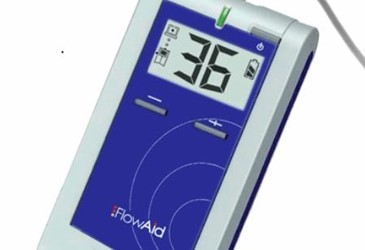FDA Clears Portable Device To Improve Blood Flow At Home Or In Clinical Settings

FlowAid Medical Technologies (FlowAid), makers of non-invasive devices and therapies for circulatory disorders affecting extremities, have announced FDA approval for a calf muscle stimulation system that reduces incidence of blood clots and swelling. The portable device was designed for use in the clinical setting or at home, and the company is working to expand its indications for disease-specific conditions, such as diabetic neuropathy.
The FA100 SCCD system consists of four external channels providing waves of electrical stimulation in a sequential pattern, an effect designed to encourage the venous muscle pump — the body’s natural sequence of muscle contractions that drive blood flow through the venous valves to the heart. Inactivity, due to injury or chronic illness, can cause this system to become weakened or damaged, restricting blood flow. While similar devices work to improve blood flow by exerting pressure on the leg, the FA100 SCCD system relies on the patient’s own muscles for compression.
Clinical studies published in several international journals demonstrate the system’s ability to reduce the risk of blood clots and swelling in at-risk patient populations. According to the company, the product was designed based on patient feedback and provides painless, pressure-free stimulation while allowing complete mobility and ease-of-use in a home setting. FlowAid received CE Mark approval in July 2016 and approval from Health Canada shortly after.
“We are very excited to be able to make the FA100 SCCD available to patients in the United States who will benefit from low-frequency, comfortable stimulation of the calf muscles to increase blood flow,” said FlowAid CEO Jacob Brezel in a press release. “We plan to submit additional FDA applications to expand our claims for other disease-specific indications, including the treatment of Diabetic Peripheral Neuropathy and Lymphedema.”
In December, FlowAid announced positive results from an international study conducted with patients experiencing diabetic neuropathy. After 30 days of treatments, trial participants reported less pain, less reliance on pharmaceuticals, and improved sleep. Brezel noted in a press release that the results could alter the way researchers approach diabetic neuropathy, and said the company is planning more studies to augment these initial findings.
Related, researchers from the National University of Singapore (NUS) recently introduced a “robotic sock” that reduces rate of deep vein thrombosis by mimicking natural contractions in the leg and ankle. Soft actuators minimize risk of injury from excessive force.
Global increases in aging populations and worldwide trends towards the cost-effectiveness of home healthcare compared to extended hospital stays are the major drivers of growth in the home health equipment market, according to a recent report by Meticulous Research. Global sales in home health equipment are projected to reach $48.47 billion by 2022.
